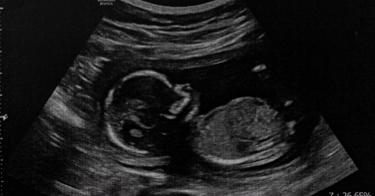"When a child loses his parent, they are called an orphan. When a spouse loses her or his partner, they are called a widow or widower. When parents lose a child, there isn't a word to describe them. This month recognizes the loss so many parents experience across the United States and around the world."
Those were the words President Ronald Reagan spoke when he declared October "Pregnancy and Infant Loss Awareness Month" in 1988. It's a pain that's all too common, as I learned firsthand last year.
While we don't know with certainty, an estimated 10 to 15% of pregnancies end in miscarriage. And according to the Centers for Disease Control and Prevention, losses after 20 weeks of pregnancy account for roughly 24,000 stillbirths every year in the United States.
I lost my second child to miscarriage in 2019. He or she would have turned one in October. Instead of celebrating with a cake and presents and pictures, my family is instead acutely aware that someone is missing—that there's a void; an empty seat at the table.
Going from the hopeful anticipation of a new baby to the crushing blow of loss was emotional whiplash. I found myself paralyzed with uncertainty because I had no idea what I was supposed to do next.
Thankfully, my frantic Googling led me to the website for the Holy Innocents Ministry of the Archdiocese of Baltimore. It provides resources, comfort and burial for children lost to miscarriage for bereaved parents, regardless of faith background.
Being afforded this familiar grieving ritual was a critical component to my healing, and helped the loss feel less abstract. And I'm grateful that my doctor immediately provided me with information for a local counseling service that specializes in perinatal and pediatric bereavement.
Everyone processes loss differently, of course, and I know my needs aren't exactly the same as another person's. But anecdotally, I know that the resources and support I received would have been appreciated by other bereaved parents who did not receive similar encouragement. As a society, we can do so much more to meet the needs of bereaved parents.
While some hospitals have protocols in place for pregnancy losses and offer burials and memorial services or automatic referrals to local funeral providers, many parents are left reeling from the loss and have no idea what their options are. Some hospitals and OB-GYN practices at least provide pamphlets or electronic links to resources such as local support groups, but it's by no means standard practice.
Health care professional can undergo continuing educational development to learn specifically about how to interact with patients experiencing loss in a health care setting, but many of these professionals aren't aware that such classes and programs exist.
In the medical community, developing best practices for assisting parents who have lost or are in the process of losing their pregnancy can make a profound difference in a bereaved parent's experience.
As individuals, we can do our part to help our friends and loved ones to not feel alone in their grief. Out of discomfort or fear of saying the wrong thing or uncertainty about how someone will react, it may be tempting to say silent. But a simple "I'm so sorry for your loss" can make a painful and isolating experience just a little bit less lonely.
Millions of families across the country face the profound sadness of pregnancy and infant loss. Sometimes it's prompted by a milestone, and sometimes by nothing at all. Let's resolve to let our friends and family know that they are not alone in their grief and that their child's life, no matter how brief, mattered.
Earlier this year I was blessed to welcome a daughter—my third baby, and second one to hold earthside. The night before I left for the hospital to meet her, my husband was doing some last minute tidying around the house. He came across the ultrasound photo of our lost little one—a photo I had regrettably misplaced months before.
I know the timing wasn't pure coincidence. And I knew that it was okay to feel simultaneous sadness for the child we lost while feeling excitement for the one we were about to welcome to the world. It's okay for me to grieve on what should have been a first birthday for my second child while at the same time feel so grateful for my baby girl as I rock her to sleep.
To every person who has walked this road, whether it was recent or many, many years ago, I see you and I am so very sorry for your loss. Your grief is valid. And your little one's life, however brief, mattered.
This piece originally appeared in ArcaMax on 10/28/20




